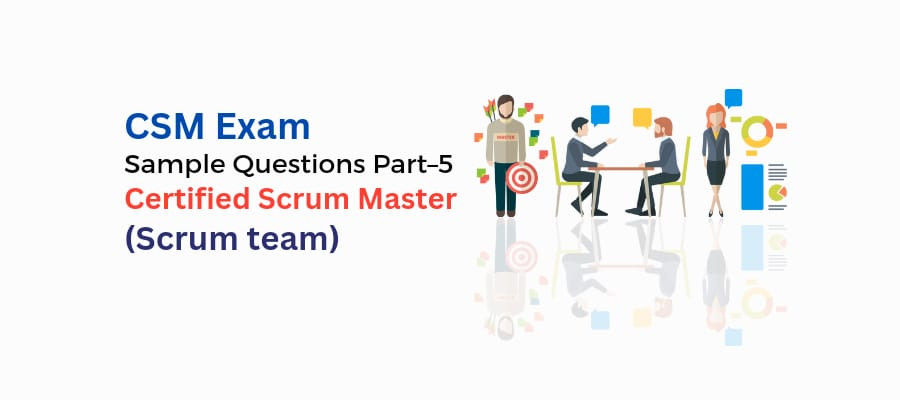CSM Exam Sample Questions Part 5: Scrum Team

Welcome back, Scrum Masters in the Making! This supplementary section of our CSM test preparation series digs deeper into the heart of Scrum: the Scrum Team.
The Scrum Team is the central element that drives Scrum product development. Understanding how this cross-functional, self-organizing team works is critical for passing your CSM certification and creating a collaborative and productive Scrum environment.
Let's test your knowledge with some sample questions:
Q: The typical size of a Scrum Team is:
- 3-9
- 5-11
- 9
- 10 or lesser
Q: The following is accountable for maximizing the value of the product resulting from the work of the Scrum Team:
- Developers
- Product Owner
- Scrum Master
- Scrum Team
Q: Product Backlog Items (User Stories) can be written by:
- Product Owner
- Scrum Master
- Developers
- Any of the above.
Q: Developers plan their own work. However, the following also has the right to tell them how to convert Product Backlog Items into an Increment:
- Scrum Master
- Project Manager
- Customer
- None of the above
Q: When the Sales department Vice President asks the Developers to add a new urgent item to the ongoing Sprint:
- The Developers should immediately add to the current Sprint Backlog.
- The Developers should suggest to contact the Product Owner.
- The Scrum Master should suggest the Developers to take up in the next Sprint.
- The Developers should cancel the ongoing Sprint, and take up the new item in the next Sprint immediately.
Q: Product Owner can compromise one of the following characteristics under certain given circumstances:
- Authority
- Knowledge
- Availability
- None of the above
Q: Whose responsibility is to track the progress of the Sprint?
- Developers.
- Scrum Master.
- Product Owner.
- Scrum Team.
Q: A cross-functional set of Developers means:
- The team, as a whole, has all the required skills to create the Increment.
- The team has only specialized members with individuals having unique skills.
- Every team member is proficient in every skill that is required to create the Increment.
- The team has all the business and technical skills for testing the release increment.
Q: The following is true for Developers:
- Create a plan for the Sprint.
- Adapt their plan each day toward the Sprint Goal.
- Hold each other accountable as professionals.
- All of the above.
Q: The following accountability doesn't exist in Scrum:
- Developers
- Product Owner
- Project Owner
- Scrum Master
Q: The following makes release decisions and release tracking:
- Developers
- Product Owner
- Release Engineer
- Scrum Master
Q: The following best describes a Product Owner's accountability:
- Direct the Developers to make a Sprint Backlog.
- Delegate Product Backlog prioritization to Scrum Master and Developers.
- Keep stakeholders away from distracting the Developers.
- Maximize the value of the product resulting from the work of the Scrum Team.
Understanding the Team Dynamics
A well-functioning Scrum Team is required for successful Scrum projects. Understanding the Scrum Team's responsibilities, dynamics, and accountabilities will prepare you to answer related questions on the CSM exam and participate effectively in a Scrum context.
Bonus Tip!
While we haven't gone into detail in this series, remember that successful Scrum Teams rely on excellent communication skills, collaboration techniques, and continual learning to produce optimal results.



